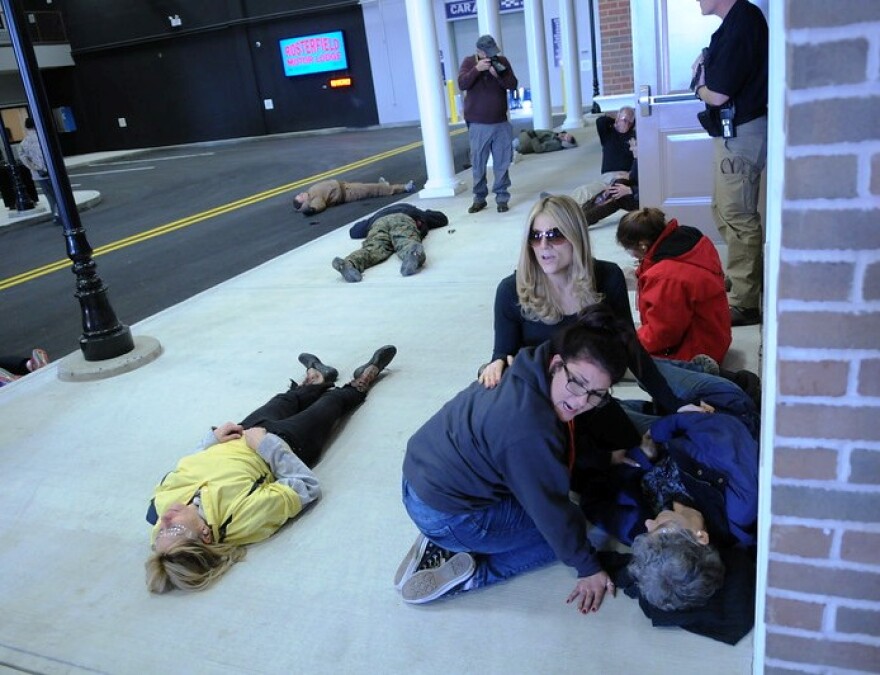The University at Albany has launched a new bachelor’s degree program in emergency preparedness, homeland security and cybersecurity.
In May, Governor Andrew Cuomo announced that the first seven students graduated with the newly created undergraduate minor from the College of Emergency Preparedness, Homeland Security and Cybersecurity located at UAlbany. The minor was launched ahead of schedule in May 2015. A year later, the school says six-course minor had an enrollment of more than 275 students, exceeding targets. Brian Nussbaum is an assistant professor of public administration. "The sort of projected number of people who were going to be involved in the minor was 50 students over several years. Within a few weeks we had over a couple hundred people who signed up for the minor. There are some of those students in areas that you might expect like Criminal Justice or Political Science who are interested, but there are also students from the School of Business and from the biological sciences."
Now, the college has received approval from the New York State Education Department to establish the bachelor’s degree program in emergency preparedness, homeland security and cybersecurity at the start of the next academic year this fall.
Interim Dean David Rousseau says the college, with its deep array of courses, is the first of its kind in the United States. "A day doesn't go by when you don't read about something related to severe weather caused by climate change, terrorism, cyberattacks. It'll allow us to move forward in both research, but teaching as well as service in these areas."
Nussbaum says there will be no shortage of need for graduates' services. "In a perfect world we wouldn't have to have these functions. But unfortunately it's not a perfect world and we do have to have these functions, and what we want is the best people and the most well-prepared and well-equipped people to sort of go in and help with us responding to what are often bad days, whether it's a terrorist attack or a cyberintrusion or sort of a natural disaster, we want professionals who really sort of show up and respond effectively."
The new major is designed to be a broad liberal arts degree with a core curriculum of six classes, including: "...things like critical thinking, communication, ethics, leadership, as well as something that varies like homeland, emergency preparedness and cyber. The experiencial learning component really is designed to allow students to take what they learn in the classroom and apply it in a real-world setting. So they'll have small research seminars working on real-world problems."
Nussbaum adds all the students will do internships. "And all the students will work on a research capstone project for an external client, so some organization, whether it be a state agency or a business, will come up with a series of questions and the students will work in teams supervised by faculty, to sort of put together presentations or white papers or other things that those clients would benefit from. The goal is to make this as applied and connected to the real world as possible."
Aside from global terrorism there are other international problems and issues facing the next generation. "Think of the immigration debate in the United States as well as the immigration crisis in Europe. This program will have courses on immigration and border security. We're also offering courses in public health preparedness to deal with things like Zika and Ebola in conjunction with our school of public health. And we're working in areas of cybersecurity, everything from digital forensics to areas like cryptography and others."
UAlbany President Robert Jones hails the new major as "a key component of UAlbany’s academic expansion."
Earlier this year, Governor Cuomo announced that the University at Albany will redevelop 12 acres in the southwest corner of the Harriman Campus to construct a new Emerging Technology and Entrepreneurship Complex to house the College of Emergency Preparedness, Homeland Security, and Cybersecurity, as well as headquarters for the New York State Mesonet, a state-of-the-art weather observation system developed to support better planning for extreme and dangerous weather events.
About the University at Albany
Educationally and culturally, the 17,300 student-strong University at Albany-SUNY offers more than 120 undergraduate majors and minors and 125 master's, doctoral, and graduate certificate programs. UAlbany is a leader among all New York State colleges and universities in such diverse fields as atmospheric and environmental sciences, business, criminal justice, emergency preparedness, engineering and applied sciences, informatics, public administration, social welfare, and sociology taught by an extensive roster of faculty experts. It also offers expanded academic and research opportunities for students through an affiliation with Albany Law School.







